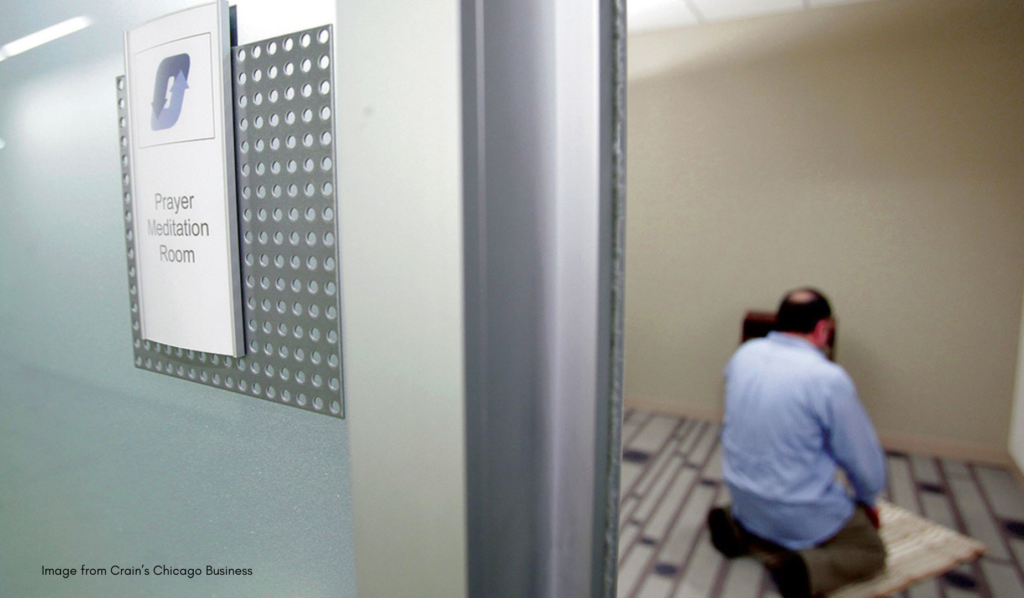In today’s diverse workforce, religious accommodation plays a crucial role in fostering inclusiv
e and equitable workplaces. Whether it’s allowing for prayer breaks, accommodating religious dress codes, or providing time off for religious holidays, employers must navigate the challenges of religious accommodation to ensure they don’t discriminate against employees based on their religious beliefs. Employee rights to religious accommodation is a protected class under the Title VII of the Civil Rights Act and the Fair Employment and Housing Act in California, which prohibits discrimination based on religion.

In this article, we will explore the different forms of religious accommodation, identify common discrimination challenges faced by employees, and provide guidance for employers on how to establish a fair and inclusive workplace.
Why Does Religious Accommodation Matter?
Religious accommodation is not only a legal requirement but also a fundamental aspect of respecting employees’ religious freedom and promoting diversity in the workplace. By fostering an inclusive environment that accommodates diverse needs, employers demonstrate their commitment to creating a workspace where individuals can freely express their faith without encountering unfair treatment or discrimination. This, in turn, boosts employee morale, increases productivity, and builds a positive company culture that values diversity and supports employee well-being.
Key forms of employment discrimination
Types of discrimination in the workplace can take various forms, including religion and racism towards one’s national origin. Some common examples of religious discrimination may involve denying job applicants and/or opportunities, imposing unfair policies, or creating a hostile work environment due to an employee’s religious beliefs or practices. Employers must be aware of these discriminatory behaviors and take proactive measures to prevent and address any instances of discrimination in the workplace to ensure a fair and inclusive environment for all employees.
Legal Background and Insights: Protecting Employee’s Rights
Title VII of the Civil Rights Act of 1964 serves as a vital legal framework for ensuring religious accommodations in employment. This legislation prohibits employers from discriminating against employees based on their religious beliefs or practices and requires them to make reasonable accommodation unless it poses an undue hardship on the business. It is important for both employees and employers to understand the scope and implications of Title VII to navigate the challenges of religious accommodation effectively.
Similarly, the Fair Employment and Housing Act prohibits employers with five (5) or more employees from discriminating against, harassing or retaliating against (which includes wrongful termination) an employee based on that employee’s religious beliefs.
California has the strongest civil rights protections for employees in the United States. As such, our firm almost always brings claims on behalf of its clients in state court under the Fair Employment and Housing Act instead of the Civil Rights Act and its progeny.
There are exceptions to religious discrimination protections in California, including religious organizations not organized for profit.
Religious accommodations can vary depending on individual beliefs and practices. Some common examples include allowing employees to have prayer breaks, providing private spaces for religious observance, accommodating religious dress codes such as hijabs or turbans, and making adjustments to work schedules to accommodate religious obligations. Employers must engage in a dialogue with employees to determine the necessary accommodations and find solutions that meet their religious needs while considering the operational requirements of the business.
Bottom line, it is never legal for your employer to treat you differently because of your religious beliefs. That said, believing you were subjected to unlawful discrimination based on your religious beliefs and proving that claim are two different things. It is not easy to prove your employer’s intentions. For instance, if your employer has a plausible reason for taking adverse employment action (terminating your employment, failing to promote you, reducing your pay, etc.) such as performance, missing work, being late, disciplinary/behavioral issues, etc., your attorneys have to show that the proffered justification for the employer’s conduct is pretextual. As such, you will need by your side experiences legal professionals to guide you through the process and provide you with fair, zealous and transparent advice. Evidence has to be gathered, the facts have to be reviewed, and prospects for success considered before a decision is made as to whether the case moves forward. A vital part of prelitigation investigation includes securing a complete copy of your employment (personnel) file and closely reviewing it for evidence of your employer’s pretextual intention.
How to Establish Religious Accommodation
To establish religious accommodation, employers should follow these guidelines:
- Educate managers and employees about religious accommodation and the importance of diversity and inclusion in the workplace. Emphasize that there are anti-discrimination laws that have consequences.
- Develop clear policies and procedures for requesting and implementing religious accommodation. These policies should be easily accessible to all employees.
- Establish a confidential process for employees to request accommodation, ensuring that managers and supervisors handle these requests with sensitivity and respect for privacy.
- Engage in an interactive process with employees to determine the reasonable accommodation needed to practice their religion while considering the operational needs of the business.
- Make efforts to provide reasonable accommodation unless they impose an undue hardship on the business. Employers should consider factors such as cost, disruption to the workflow, and impact on other employees.
Steps for employers to prevent discrimination
In addition to establishing religious accommodation, employers can prevent discrimination by taking the following steps:
- Promote a culture of respect and inclusivity, encouraging open dialogue and understanding among employees with diverse religious backgrounds.
- Provide training to managers and employees on recognizing and addressing religious discrimination, ensuring they understand their responsibilities and the legal implications.
- Regularly review policies and practices to identify and eliminate any potential biases or discriminatory practices.
- Respond promptly and effectively to any allegations or complaints of religious discrimination, conducting thorough investigations and taking appropriate disciplinary action, if necessary.
- Periodically evaluate the effectiveness of religious accommodation and make necessary adjustments to ensure employees’ needs are met.
Through the adoption of these measures, employers can adeptly address the complexities associated with religious accommodation and discrimination, fostering a workplace that celebrates diversity and upholds the rights and beliefs of every employee.
Conclusion: Fostering Inclusive Workplaces
Prioritizing religious accommodation in employment is not only about meeting legal requirements but also about creating a harmonious and inclusive work environment. By embracing religious diversity and accommodating the needs of employees, employers can reap numerous benefits.
Why prioritizing religious accommodation benefits everyone
When employers prioritize religious accommodation, they:
- Promote diversity and inclusion, fostering a sense of belonging for employees from different religious backgrounds.
- Attract and retain top talent, as employees are more likely to stay in an organization that respects their religious beliefs.
- Enhance employee morale, job satisfaction, and overall productivity.
- Create a positive company culture based on mutual respect, trust, and understanding.
- Foster strong relationships with customers and stakeholders who value diverse and inclusive workplaces.
Tips for employees and employers to navigate discrimination
To navigate discrimination challenges, employees and employers should:
- Understand their rights and obligations under the Fair Employment and Housing Act.
- Engage in open and respectful communication regarding religious accommodation.
- Seek legal advice or assistance when facing discrimination issues.
- Continuously educate themselves on religious diversity and cultural practices.
- Promote a work environment where everyone’s beliefs are respected and valued.
By working together, employees and employers can build inclusive workplaces that accommodate religious beliefs and contribute to a fair and harmonious society.
Do you believe you have been discriminated against based on your religious beliefs?
Document. Document. Document. These are the three basic rules of increasing the likelihood of a successful religious discrimination claim.
When you first believe that you are being treated differently because of your religious beliefs, take notes. Write down what happened, who said what, why it happened, and who witnessed it?
Then, complain to your immediate manager/supervisor in writing (email, letter, etc.) and ask for an investigation into your claims. And clearly set forth your claims. But doing so, don’t forget to tie your factual claims (i.e. what happened, what was said, etc.) to your religious beliefs.
Finally, follow up. If there is no response, email a request for an update.
The sooner you document, the better.
Finally, get in touch with an experienced employment law attorney for advice.



